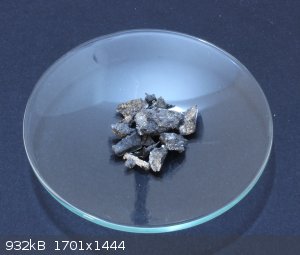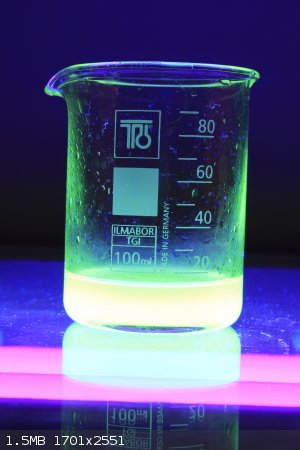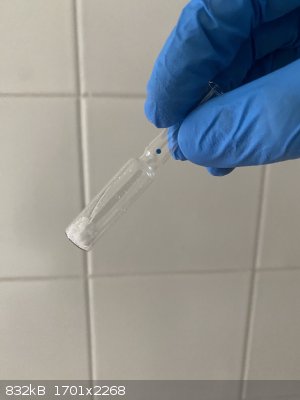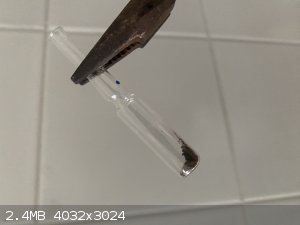ItalianChemist
Hazard to Others
  
Posts: 172
Registered: 26-1-2011
Location: Italy
Member Is Offline
Mood: No Mood
|
|
Fake Terbium?
Hello everybody, some time ago I purchased a 10g sample of "terbium" from eBay.
Now I dissolved in HCl, but it does not seems like Terbium at all. There is no trace of green fluorescence. At the beginning I thought it could have
been quenched by water, but there is no way to see the green fluorescence even with the dry product.
Precipitating the tungstate gives a slightly pink fluorescence(?).
I don't know what it could be, maybe some cheaper rare earth?
It appears to not be fluorescent at all!
Now I precipitated with NaOH and kept the Hydroxide (white powder)
It could be possible that the fluorescence is somehow quenched by water? I think it should be visible in minimum amount.
here is a photo of it and a photo of a real terbium solution I got previously.
 
|
|
|
Maurice VD 37
Hazard to Self
 
Posts: 66
Registered: 31-12-2018
Member Is Offline
|
|
Why don't you first weigh a bit and dissolve it in HCl, then evaporate the solution. Or precipitate the solution with NaOH, or with another reactant,
then filtrate and weigh the precipitate ? Comparing the weights should give you an information.
|
|
|
ItalianChemist
Hazard to Others
  
Posts: 172
Registered: 26-1-2011
Location: Italy
Member Is Offline
Mood: No Mood
|
|
Quote: Originally posted by Maurice VD 37  | | Why don't you first weigh a bit and dissolve it in HCl, then evaporate the solution. Or precipitate the solution with NaOH, or with another reactant,
then filtrate and weigh the precipitate ? Comparing the weights should give you an information. |
I already recovered the precipitate.
Unfortunately I don't know if I lost some product during the filtration, so I don't know if it would work!
The metal could have a slightly lower atomic weight, because it didn't fully dissolve in the acid!
[Edited on 11-12-2023 by ItalianChemist]
|
|
|
Bedlasky
International Hazard
    
Posts: 1241
Registered: 15-4-2019
Location: Period 5, group 6
Member Is Offline
Mood: Volatile
|
|
Iron contamination is usually big problem in fluorescent materials. Tb(III) is very slightly pink, so don't expect to observe some strong coloration
of its compounds. If you add NaOH and persulfate in to your Tb(III) solution and heat it, you should obtain black precipitate of terbium(III, IV)
oxide Tb4O7. Only preseodymium give you similarly looking product (but Pr(III) is green solution, so you cannot mistake it for Tb(III)).
|
|
|
ItalianChemist
Hazard to Others
  
Posts: 172
Registered: 26-1-2011
Location: Italy
Member Is Offline
Mood: No Mood
|
|
Quote: Originally posted by Bedlasky  | | Iron contamination is usually big problem in fluorescent materials. Tb(III) is very slightly pink, so don't expect to observe some strong coloration
of its compounds. If you add NaOH and persulfate in to your Tb(III) solution and heat it, you should obtain black precipitate of terbium(III, IV)
oxide Tb4O7. Only preseodymium give you similarly looking product (but Pr(III) is green solution, so you cannot mistake it for Tb(III)).
|
Tb salt are white, but they have very strong green fluorescence.
I already have some small sample of terbium compound. They have most intense fluorescence I have ever seen.
With NaOH only the hydrated hydroxide seems to precipitate.
I will test for iron presence, but I don't think it is the case.
[Edited on 11-12-2023 by ItalianChemist]
|
|
|
ItalianChemist
Hazard to Others
  
Posts: 172
Registered: 26-1-2011
Location: Italy
Member Is Offline
Mood: No Mood
|
|
It seems to contain some Iron. Maybe this is the reason why it isn't fluorescent
|
|
|
Bedlasky
International Hazard
    
Posts: 1241
Registered: 15-4-2019
Location: Period 5, group 6
Member Is Offline
Mood: Volatile
|
|
You must add persulfate and heat it in the order to oxidize Tb(OH)3 to Tb4O7.
|
|
|
ItalianChemist
Hazard to Others
  
Posts: 172
Registered: 26-1-2011
Location: Italy
Member Is Offline
Mood: No Mood
|
|
I have some old persulfate, I will try if it works!
I've seen that it could be obtained also heating the hydroxide to high temperature!
Thank you!
|
|
|
ItalianChemist
Hazard to Others
  
Posts: 172
Registered: 26-1-2011
Location: Italy
Member Is Offline
Mood: No Mood
|
|
Ok so I think I can confirm this is Terbium
I got a small sample of the hydroxide and heated until it became red hot for a couple of minutes.
I obtained a black powder that should be Tb4O7, or a mixture of oxides.
The oxide obtained is pretty inert and doesn't seem to react with HCl.
None of the oxide shows any fluorescence
 
|
|
|
Bedlasky
International Hazard
    
Posts: 1241
Registered: 15-4-2019
Location: Period 5, group 6
Member Is Offline
Mood: Volatile
|
|
You can try dissolve Tb(OH)3 in sulfuric acid and make some terbium sulfate. Lanthanide sulfates have very low solubility in boiling water, so you can
precipitate most of terbium sulfate by heating the solution. In this way you should obtain pure terbium sulfate, iron contamination stay in the
solution (just make sure you have small excess of H2SO4 in the solution to prevent precipitation of iron as basic sulfate).
|
|
|
ItalianChemist
Hazard to Others
  
Posts: 172
Registered: 26-1-2011
Location: Italy
Member Is Offline
Mood: No Mood
|
|
Quote: Originally posted by Bedlasky  | | You can try dissolve Tb(OH)3 in sulfuric acid and make some terbium sulfate. Lanthanide sulfates have very low solubility in boiling water, so you can
precipitate most of terbium sulfate by heating the solution. In this way you should obtain pure terbium sulfate, iron contamination stay in the
solution (just make sure you have small excess of H2SO4 in the solution to prevent precipitation of iron as basic sulfate). |
Unfortunately all sulfuric acid that I have has a dark color so I think I would end up with a huge mess.
I think I will make Terbium acetate and, for the moment, I will keep that way.
|
|
|
ItalianChemist
Hazard to Others
  
Posts: 172
Registered: 26-1-2011
Location: Italy
Member Is Offline
Mood: No Mood
|
|
So it seems that Iron(III) acetate is completely insoluble in water.
Dissolving and acetic acid and filtering should remove the iron. I will try it and post result once I've done.
|
|
|